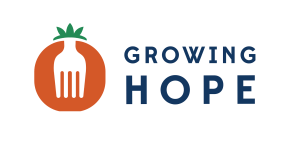
Growing Hope is an Ypsilanti-based non-profit that focuses on "strengthening and supporting the local food system throughout the community and beyond.”
They manage two farmers markets, a community farm, several school programs, and an “Incubator Kitchen” that helps local food businesses get started, all with the goal of promoting the growth and consumption of locally produced food. We spoke with Julius Buzzard, the Executive Director of Growing Hope, to find out more about their organization and the work that they do.
Growing Hope’s Timeline
2003: Growing Hope was founded by Amanda Edmonds in 2003 as part of her graduate program in education. She started the 501(c)(3) nonprofit to support the development of a school garden project at Perry Elementary in Ypsilanti. Amanda stayed on as the Executive Director for 14 years, through several periods of major change which saw the organization grow to include all of their current programs and projects.
2006: In order to address the “food desert” in downtown Ypsilanti, Growing Hope founded the Downtown Ypsi Farmers Market, now called the Ypsilanti Farmers Marketplace. The market helped pioneer systems such as “Double Up Food Bucks”, which allow market customers to not only use food assistance benefits to purchase food from the market, but to receive extra purchasing power specifically to buy fresh fruits and vegetables.
2007: Originally headquartered in an office on Washington Street in Ypsilanti, Growing Hope purchased a house and some land on Michigan Avenue in 2007 in order to have more space for employees and volunteers and to prepare the land for their highly successful community farm project.
2008: Growing Hope opened the Growing Hope Center and Urban Farm, which continues their initial mission of getting local public-school students involved in growing their own food and reconnecting with the Earth. Their mission has expanded to include volunteers and employees of all ages from the local community.
2013: The organization took over management of the Depot Town Farmers Market, which was revitalized by the organization’s dedication to the community and local food.
2018: More recently, their “Incubator Kitchen” was completed in 2018, allowing locals interested in starting new food businesses the chance to use a shared commercial kitchen to safely prepare food for restaurants, cafes, for sale at local markets, or any number of other business ideas. Many have since moved on to their own spaces, but new local entrepreneurs ensure that the kitchen is always filling an important role in the community.
2020: Growing Hope added the Ypsi Area Online Market, a year-round online farmers market that helped local farmers adapt to COVID-19 and the associated restrictions.
Mission and Vision
 Through all of these changes, Buzzard says the organization has developed more of a bent towards social justice, food justice, and local sovereignty through education. He also sees Growing Hope assisting the local community in "moving beyond thinking about how to access food and more towards helping the community take ownership of their food systems."
Through all of these changes, Buzzard says the organization has developed more of a bent towards social justice, food justice, and local sovereignty through education. He also sees Growing Hope assisting the local community in "moving beyond thinking about how to access food and more towards helping the community take ownership of their food systems."
The group’s mission statement reads: “Growing Hope fosters an equitable and sustainable local food system where all people are empowered to grow, sell, buy, prepare, and eat nourishing food.”
Their vision statement gets more specific, stating that “Ypsilanti is a community where all people—particularly those with barriers due to race, class, culture, language, ability, and mobility—have access to nourishing local food that is culturally appropriate and affordable, can grow and prepare their own harvest, and may earn a living as a good grower, producer, or entrepreneur.” Buzzard expands on this, telling us that Growing Hope's “core belief is that food is a basic human right,” and that the best way to ensure the community can exercise that right is through education on producing and preserving food, and on how to pursue a more just and equitable food system.
Looking Towards the Future
Given all that has been accomplished through Growing Hope’s many projects, it’s safe to say that they have found a lot of success. But they're not stopping there—Growing Hope has even more plans in store.
Buzzard states, “I’m very excited about where we are as an organization. I’ve been here about two years, doing a lot of work with interviews, focus groups etc. to learn how to be what the community needed, how to ignite their passions for and power over their own food systems. Now we’re all really empowered to activate the next phases!”
He tells us that the local community can look forward to sliding scale CSAs (Community Supported Agriculture programs) with the goal of getting more people involved in the farming and market spaces. Buzzard is also looking forward to renovations for the market spaces, saying, "We want to make sure they look and feel welcoming and safe for everyone.”
Employees are Essential
When Amanda Edmonds first founded Growing Hope, she was the only full-time employee. They have since grown to a staff of 10 full-timers at the Michigan Avenue farmhouse, 12 teenagers from local schools employed part-time year-round, with the summer months typically seeing nine paid interns and 150 or more volunteers who last year contributed over 1,000 hours among the various programs.
As for Buzzard himself, he describes his work as Executive Director as “doing a lot of what needs to be done” in regard to supporting the staff and volunteers, as well as co-leading the organization by orchestrating what’s needed, where, when and by whom.
He also coordinates with other organizations in the community, engaging with groups and individuals to get more people involved in local food systems, and pursuing grants and other funding sources to make it all possible. “Working with other orgs, especially local food-based orgs, has helped to amplify the influence of us all,” he notes.
Want to Get Involved?
You can get involved through providing donations, accepted by mail or online, or by applying on their website to be a volunteer or employee for the farmers markets and urban farm.
Community members are also encouraged to attend their educational events, both on and off the farm, and community dinners as participants even if they cannot commit volunteer time. “Shop local! Come to the farmers markets, or shop the online market!” Buzzard adds, saying that he wished more people understood the breadth of the work they do in the community. Even Growing Hope's volunteers tend to interact with one aspect or another, such as the after-school programs or the farmers market, without realizing the full scope of everything the organization does in the community.
“Everybody is welcome in our spaces!" Buzzard emphasizes. "On the farm, in the kitchens, everywhere! It’s a great chance to reconnect with the Earth and take a break from modern life.”


Add a comment to: Know Your Org: Growing Hope